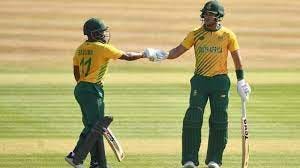Proteas anchors need to anchor at a scoring rate that influences the outcome of the match.
A look at some of the questions selectors may need to answer.
Cricket has evolved so much in the last couple of years and apart from just rule, playing conditions etc, the way in which the game needs to be played has also changed. The inception of T20 cricket played catalyst to this change. This is change that has required many teams and players to adapt their playing styles to be able meet the modern requirements of cricket. Some teams have managed to catch up, some are catching up and some may never catch up.
The birth of this short and fast format of the game has been met with quite contrasting views which could be why some countries have fallen behind when it comes to it. Purists were obviously not happy because they felt that this format would not be good for test cricket, an argument still being made by several purists in world cricket. That is, however, a topic for another day. T20 cricket is a game of aggression, whether with the bat or ball and whilst purists may not agree, T20 cricket is also about being street smart and being able to think on your feet.
The Proteas are currently taking on India in a T20i series as preparation for the T20 and one must admit that even after winning the first two T20 internationals, the Proteas side is proving to have several cracks from squad balance to brand of cricket. South African cricket might be showing signs of a country that is still needing to adapt to T20 cricket in general. The best sides in the world do not rely on one or two players to score big runs but the Proteas do. The main cause of this being the fact that in South African cricket, an “ANCHOR” is a thing. Well to be honest, in general in cricket an “anchor” is a thing but whether it is a thing in T20 cricket remains something I am not too sure about. The Protea are currently without Aiden Markram and Quinton de Kock and that has left the side sitting with a top 4/5 that has 3 batters who are naturally slow starters. Rassie, Reeza and Temba are all naturally slow starters and even though they have the ability to score quickly, it is not their natural game. Some may argue Rassie’s case based on his innings in the first T20 against however, that innings was a typical innings from Rassie where he too more than 20 balls to get going. Fortunately, David on the day was firing. How these 3 gentlemen play plays a massive role in the success of the team. There are times where their styles of play are suitable, but those times are extremely far apart because those times are generally when the pitch is not easy to bat.
If the Proteas are to continue with anchors in the side, the anchors will have to find a way to anchor innings at a quick enough scoring rate to influence matches. T20 cricket has since moved on from 120-125 strike rates. England’s probable T20 XI strikes between 135 and 158%. The Proteas need batters who are naturally aggressive that can drop anchor when need and not batters who are naturally slow scoring because even if they were to say they are able to accelerate, there is never a guarantee that after facing 30 balls, you will be able to accelerate and not go out. Rassie himself was dropped just before he accelerated and that catch would have won the match for India and lost it for the Proteas.
Promoting Dwaine Pretorius in the first T20i was a master stroke but many of us failed to understand the ratiocination when it was done in the other T20is as well. Was he really promoted in the first T20i or was he always going to bat 3 in order to shield Rassie and Miller? Well, whatever the answer to the question is, Dwaine needs to bat 7 and finish matches for the Proteas. This would also mean that Wayne Parnell, who has bowled extremely well this series does not have to play as a finisher because he is not a finisher. Some of South Africa’s cracks could easily be filled by the selection of Faf du Plessis and Imran Tahir who made themselves available for selection. The Proteas may have won the first two matches of this series but that one match they lost exposed several things that some of us have been concerned about for a while. The think tank will have to sit down and reassess the situation, look at the current squad, other options from outside of the squad and decide what direction they want the team to take. A lot of pressure will be on captain Temba Bavuma to start scoring some runs this series as well. One cannot fault his captaincy much, but he is yet to do anything with the bat.


